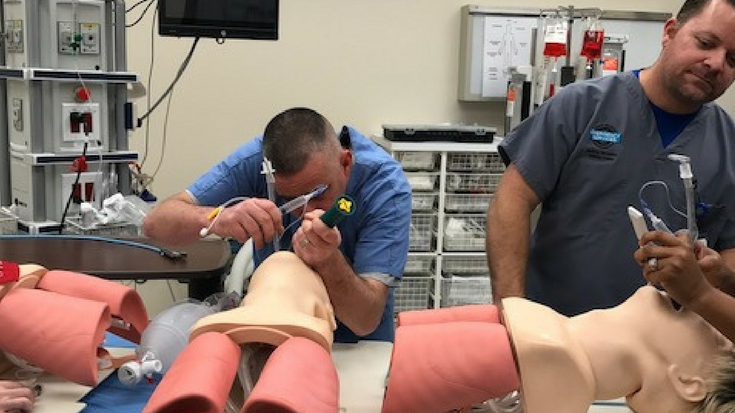
At Texas Health Southwest in Fort Worth, CRNAs traditionally managed emergent intubations. This included paging them to the floor unit and pulling them away from the OR in order to respond to the Code Blue. At times, further delays could take place if the call to respond was not initially heard.
Since RTs in Texas are licensed to perform intubations, why not use them to respond to these Code Blues instead? Matt Nolan, BSRC, RRT-NPS, RRT-ACCS, and cardiopulmonary director at Texas Health Southwest, decided there was no reason not to – and a multitude of reasons why they should.
Training begins
“We realized that, due to the high surgery volume, it would be beneficial not to pull a CRNA out of the OR for a task that can be safely accomplished by a respiratory therapist,” Nolan said.
While the hospital does staff one overnight CRNA, a team of RTs is available around the clock. Therapists are also more cost effective practitioners than CRNAs.
This cross-training idea aligned with the mindset at Texas Health, where allowing clinicians to practice at the full extent of their license is considered an excellent way to save on costs.
The concept was approved, and Nolan and his medical director selected the first set of therapists for training in the clinical simulation lab. Classes are taught by a CRNA and paramedic, and therapists who earn a certificate of completion work closely with the OR and CRNA to observe and perform five intubations on OR cases.
“After the initial training, the respiratory therapist is then required to maintain and demonstrate competencies by either successfully intubating three patients in a six month period or going through the classroom and SIM training every six months to be checked off on the skill,” Nolan said.
Today more than half of the RTs in the department have been trained and are handling Code Blue intubations in the facility. Two therapists respond to each call, with one responsible for setting up the intubation field and examining the patient and the other providing ventilation until it is safe for the intubation to take place. In difficult cases, the CRNA will still respond to administer any sedation the patient requires in order for a successful intubation to take place by the RT.
Nolan has instituted a process improvement initiative as well, using a form that tracks first and second attempt successes or opportunities for improvement on each case.
Keep on keeping on
This change did not happen overnight. Nolan explained that untold hours went into defining the program and working with all the members of the multidisciplinary team to bring it to fruition. Overall, this program has proven successful. Nolan’s therapists are not only helping the hospital realize a cost savings, they are also developing better relationships with the pulmonologists and the OR, an area typically not frequented by RT staff.
“If you have thought about any new program you will be met with the question of ‘why’ and hear ‘no’ frequently, but it is up to each department to keep pushing for the advancement of the RT profession in any area of patient care,” Nolan said. “We must all show the value of our profession each and every day. Celebrate the small successes and learn from your setbacks, but do not let the setbacks stop the overall process.”